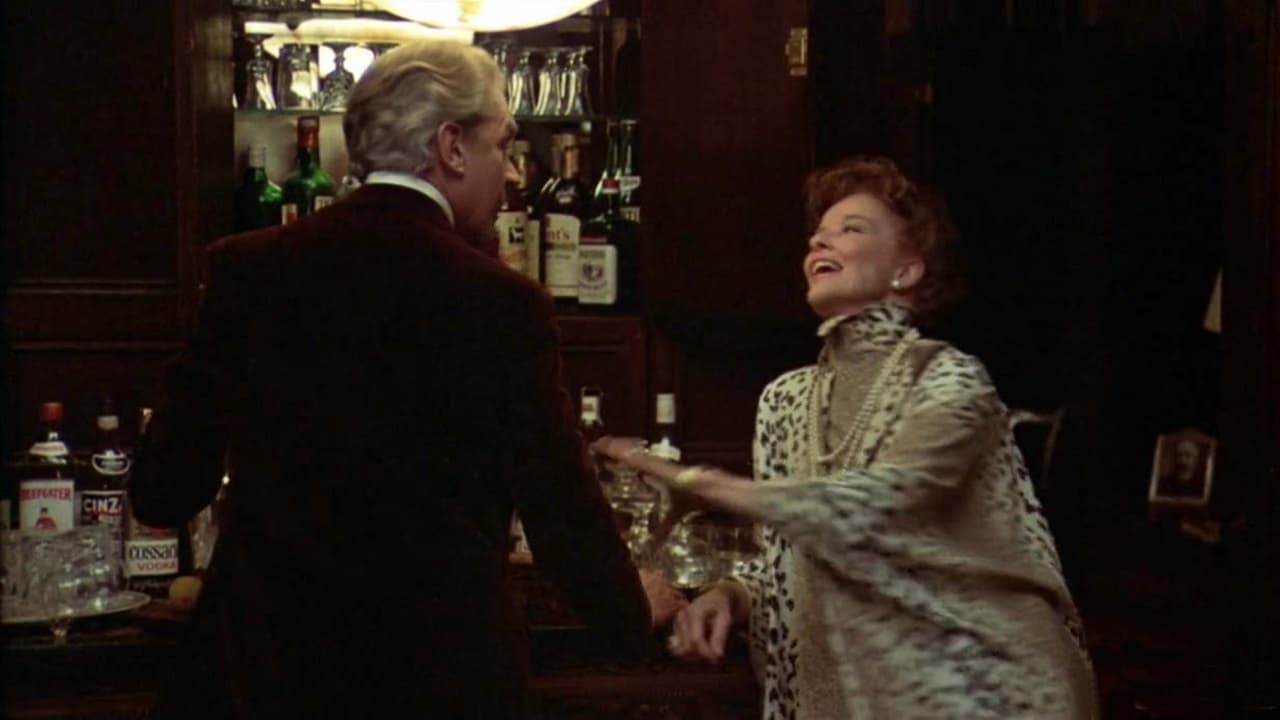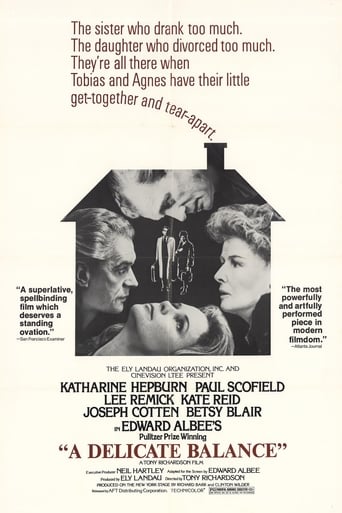

Of course, "A Delicate Balance" can not be spoken of without referring to some way to Albee's other masterpiece, "Who's Afraid of Virginia Woolf?" I think the Pulitzer that "A Delicate Balance" won was supposed to be shared by "Woolf," which was rejected at the time for being too vulgar.Not to say that "A Delicate Balance" is not a worthy dramatic work. It's an incredibly intelligent script; Albee makes broad statements about love and aging here that might be missed in a first viewing. Yet "Woolf" shows a much smoother weaving of absurdism into matters than "Balance." I was far more convinced by George and Martha's "son" than I was by Harry and Edna's "terror." As far as transitioning from stage to screen, I thought "Woolf" was also much better, but mostly because of Mike Nichols and Haskell Wexler, the cinematographer.The cinematography here, I felt, was meant to look as much like a stage play as possible. And at times, I liked it. And the acting is so good in this movie (for the most part) that I was still hooked. But the whole time, I was thinking, "What if Mike Nichols directed this?" Alas, because there is no music either (it would have been nice), we're left only with the acting. And what a fine cast. Katherine Hepburn has a difficult role to pull off with Agnes; she is both the "fulcrum" of this family and, admittedly, part of its defeat. And she does it so well. There is this agony in her eyes towards the latter half of the film that you just can't look away from. And I like her mannerisms, the way she toys with words, the voices she does. Sure, sometimes a few words are lost, but it seemed fitting to the character. Agnes makes speeches (Claire and Tobias have a nice dialogue about this after Agnes's first exit), and I think she makes them for herself as much as she does anybody else. And Hepburn makes it all intriguing. She holds her ground as arguably the finest actress of American cinema.Paul Scofield ultimately disappointed me. Yes, he is bland and ineffectual, and despite the strength in his eyes, the confidence of his body language, he never quite makes a difference. He pulls all of that off well. And he does have one fantastic moment where Agnes says, "I'm not an old woman, am I?" and, perhaps inspired by Claire and her accordion and drunkenness, grabs her chin and playfully says, "Well, you're my old lady!"--the most life we've seen in him the entire film--and Hepburn just rejects him. The way he pulls back and returns to his shell is painfully uncomfortable. But then, there is what Albee calls in the script an "aria" at the end, in the scene he has with Harry. This is Tobias's moment; the moment I waited for the entire film. I felt that Scofield botched it. He sits through almost all of it. He says only one or two of the lines with any real power, the kind of power Tobias should be storing up the entire movie. And at the end, when he cries--much too late, in my opinion--it is pathetic and almost ignored by anyone else in the room. (As the women do enter halfway through.) Anyway, I was really let down by this, and I think it's the biggest mistake this adaptation made.Meanwhile, Kate Reid practically steals the film when Hepburn isn't looking. She's absolutely fantastic as Claire. What I really loved was how Reid managed to find the sympathy in Claire. Claire was once played by Elaine Stritch--can you imagine? How terrifying. But while Reid manages to reach those levels of darkness that Stritch probably could, she also turns her twisted past into something that makes her sympathetic of others. She knows pain. And by god, if she doesn't sound EXACTLY like Elizabeth Taylor in "Woolf." It's eerie, but for fans of Albee, incredibly comforting in its familiarity. As if, "This is the way to portray an Albee woman." And she also creates a unique chemistry with each character. I loved the relationship between Claire and Tobias, and the way every "act" of this movie (except for the ending) closed with the two of them. They have a bond that Agnes is wary of. Also, notice the strange way she interacts with Harry. It's rather terrific, and never truly highlighted. Lee Remick was on and off here, but as one of the other reviewers pointed out, it's not a fully-realized role. Imagine: a woman of thirty-six divorced four times already. Where is the sense of failure, the constant rejection, the bitterness? Julia goes from being rather calm, smoking casually and turning her nose up at her mother, to a level of hysteria that would make Tennessee Williams wipe the sweat from his brow, with no clean transition. A confusing role.Finally, Joseph Cotten and Betsy Blair. Once again, not fully-developed characters. Joseph Cotten played the role as I expected him to, and that's not a bad thing. He's a terrific actor. He doesn't necessarily make any mistakes here. Betsy Blair was on and off for me, and this I felt was her acting. There was a tentativeness in her voice, a resistance to really attacking the role of Edna and making her, honestly, as unwelcome as she was in this house. She is interesting in that she begins to take over for Agnes the longer she stays (there is a shot of Hepburn realizing this, and the look of horror on her face is absolutely brilliant), but I felt that Blair could have gone further with it.I think "A Delicate Balance" is, as others have noted, a movie for Albee/theatre fans only. It's not cinematic ally engaging, but if you are familiar with the script, you may enjoy seeing an interpretation of it, particularly with Hepburn and Reid.
... View MoreThe scene is an upper class house in Connecticut. The residents are an old married couple who've had a mostly sexless marriage, an alcoholic sister, a much married daughter and a pair of irksome neighbors who've had a major anxiety attack and move in with their friends. The text is very witty and insightful, but it does not contain a single original idea. It was not original when first presented, but had I seen it in 1973 I would have given it a kinder review. We get wiser and more honest as we get older. The cast is excellent, save for Katharine Hepburn, who can only play herself. I have seen every film she ever made and have come to the conclusion that the secret of her success lay in always having been cast as a character whose personality was very close to hers. Paul Scofield, Joseph Cotten, Kate Reid, Betsy Blair and Lee Remick were true to the spirit of the text and executed their roles very well. Edward Albee's interview is an important part of the DVD. I very much enjoyed his penetrating comments about casting and the choice of Mike Nichols as director.
... View MoreI've seen the great Edward Albee play twice, and I've read it twice. This adaptation is agonizingly slow. The camera seems to be about 6 inches from the actors' faces, and I wanted to escape. I walked out of the theater after 45 minutes, before Lee Remick, Betsy Blair and Joseph Cotten showed up. See it at your own risk.
... View MoreScenes from the life of an argumentative middle-class family: a strong-willed wife and a resigning husband are confronted with her alcoholic sister, their continuously marrying daughter, and their friend couple who are afraid of being alone.Completely uncinematic, downbeat and very static photographed play, from a Pulitzer prize-winning Albee material, with all the psychological soul-killings expected from the author. A pretty valuable record of a theatrical performance: brilliant dialogue and acting are the best it can offer - and it does so.
... View More